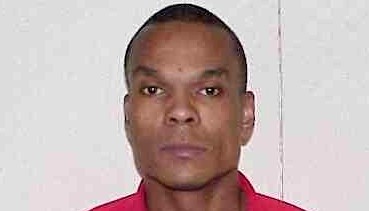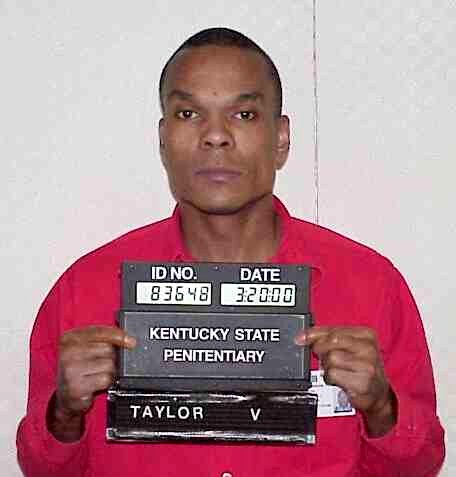The Trinity murders occurred in Louisville, Kentucky on September 29, 1984, and are named after Trinity High School.
Two 17 year old Trinity High students, Scott Christopher Nelson and Richard David Stephenson, became lost on their way to a high school football game where Trinity was playing DuPont Manual High School at Manual's football stadium on East Burnett Avenue.
Nelson and Stephenson stopped at a Moby Dick restaurant at Logan & Oak Streets to get directions, where Victor Taylor and his cousin George Wade said they would lead them to the stadium if they were given a ride.
Nelson & Stephenson were instead taken to a vacant lot behind the football stadium of Louisville Male High School on Ardella Ct. where they were forced to take off their clothes, hand over their personal property and were bound and gagged. After Victor Taylor sexually assaulted one of them, Nelson and Stephenson were shot in the back of the head to avoid the identification of Taylor and Wade.
The widely publicized murders led to the suspects when a relative who had been given a Trinity High school jacket reported George Wade to the police. Wade implicated Victor Taylor in the crime and the personal belongings of the two murdered students were found in the home of Taylor's mother.
After a change of venue motion due to publicity, the trials of Taylor and Wade were moved to Lexington, Kentucky where Taylor was convicted in 1986 of kidnapping, robbery, sodomy, and murder. Wade had previously testified against Taylor but recanted his testimony, which led to Taylor unsuccessfully appealing his conviction.
George Wade was convicted of kidnapping, robbery, and murder. Taylor is on death row at the Kentucky State Penitentiary in Eddyville, Kentucky and George Wade is serving a life sentence at the Kentucky State Reformatory in LaGrange Kentucky.
In 2000 the clothier Benetton ran a controversial advertising campaign titled "We, On Death Row" which featured Victor Taylor & 24 other death row inmates from around the United States.
DNA test results in 1984 Trinity High student slayings inconclusive
Wave3.com
Jan 17, 2008
Louisville, Ky. (AP) - DNA tests requested by a man on death row for the rape and murder of two Louisville high school students in 1984 were inconclusive after lab technicians were unable to find enough testable evidence.
The results, the first returned since Kentucky started allowing DNA tests for some death row inmates, close a significant avenue of appeal for condemned inmate Victor Dewayne Taylor.
Taylor, 47, was convicted in 1986 of sodomizing and killing 17-year-old Trinity High School student Scott Nelson and his friend, 17-year-old Richard Stephenson, after the pair became lost looking for a football game on Sept. 29, 1984. A co-defendant, George Ellis Wade, 46, is serving a life sentence for his role in the slayings.
Jeanne Anderson, an assistant commonwealth's attorney in Jefferson County, said the lack of results could have been caused by several things, including the condition of the evidence after more than two decades.
"The Commonwealth is confident we got the right person," Anderson told The Associated Press. "We've got a valid conviction."
Taylor's attorney, assistant public advocate Thomas Ransdell, declined to comment. Attempts to reach Nelson's father, Emery Nelson, were unsuccessful Thursday morning.
Kentucky's law allows condemned inmates to request genetic testing of evidence in cases that predate the use of DNA testing. Bode Technology of Lorton, Va., conducted the tests on a slide of bodily fluids taken from one of the victims. Two slides were tested at the time of Taylor's trial in 1986 for blood type, with the testing consuming one of the slides.
Taylor's attorneys sought the tests to determine if Taylor or Wade raped the student before the killings. A test result showing Wade and not Taylor as the source of the DNA evidence would cast doubt on Wade's claim that Taylor was the rapist, Ransdell said in court filings.
Wade is serving a life sentence at East Kentucky Correctional Institute in West Liberty after being found guilty of murder, but acquitted of sodomy.
The case became known as the "Trinity Murders," picking up its name from where Nelson and Stephenson went to high school. Because of pretrial publicity, the trials were moved to Lexington.
Wade told police that it was Taylor who pulled the trigger, though he did not testify at trial. Taylor's lawyers, in court filings, now say Wade would testify that Taylor wasn't present at the killings.
Four other Kentucky inmates _ Thomas Clyde Bowling, Roger Dale Epperson, Benny Lee Hodge and Brian Keith Moore _ have requested DNA testing in their respective cases.
Testing has started in the case of Moore, condemned to death for the 1979 slaying of Virgil Harris of Louisville. Tests are also under way in Bowling's case -- the 1990 murders of a couple in Lexington.
Testing in the case of Epperson and Hodge, who are awaiting execution for the 1986 killing of Tammy Acker in Letcher County, is on hold pending a Kentucky Supreme Court ruling.


